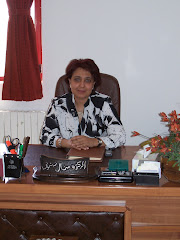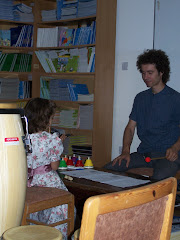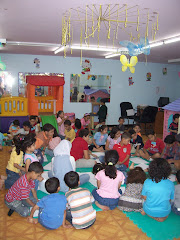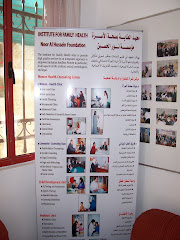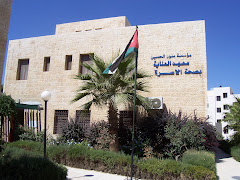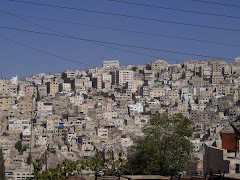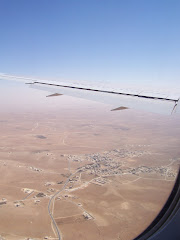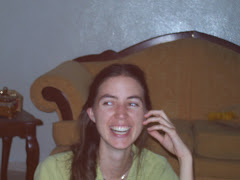Over the past few weeks, I have been fortunate to get to know Dr. Manal Tahtamouni, the Director of the Institute for Family Health (IFH). Dr. Manal graduated from the University of Jordan-Amman, specializing in obstetrics and gynecology, and is the mother of three young children. Four years ago, she had been preparing to open her own medical clinic when she learned about a position opening for the Director of IFH. She realized that such a role would allow her to address a much larger population with health services while still working part-time as a doctor. In leading IFH, Dr. Manal has spearheaded efforts to expand psychosocial counseling and created innovative programs which include music therapy for children. As the organization continues to grow, she deems the greatest challenges facing IFH are financially sustaining its unique programs and maintaining qualified staff. IFH's services require motivated professionals with specialized training which she deems not an easy combination to find. Often larger and more financially established international NGOs in Amman recruit her best staff by offering substantially larger salaries. IFH has trained and invested in staff that then get "hired away by other NGOs." In financial terms, she simply states: "We can't compete with them."
However, she leads a very dedicated team of 55 (not including 165+ volunteers on the Iraqi outreach program). Reflecting on the best parts of her job, Dr. Manal "sees the joy in the eyes and faces of beneficiaries. They smile about the services…children pushing their mothers to come here." She also shares stories of the teamwork of her staff and their shared belief in providing quality care.
When I asked whether she has plans to expand IFH's staff, Dr. Manal says there is enough staff but not enough space. Offices and counseling cubicles are at a premium given an ever-increasing clientele. Her dream is to expand the current areas of practice and in the future open another IFH branch in East Amman.
Monday, August 18, 2008
Tuesday, August 12, 2008
A world of contrast
Amman has amazed me with its contrasts, mainly immense wealth (downtown boasts a bevy of 5-star hotels) juxtaposed with crushing poverty. During the last few days, I have visited several Iraqi families as part of the Institute of Family Health's (IFH) initiative to reach out to Iraqis. Yesterday, I spent two hours cross-legged on the floor with a family of 10 – an aunt and her daughter, two nieces, a nephew, and 5 small children. Two of the children were orphaned when their parents were killed by sectarian violence in Baghdad and adopted by their aunt, now the "matriarch" of this large household. The family shares a small 3 room apartment (kitchen, sitting area, and one bedroom). Details of their heartbreaking stories are too painful and personal to repeat here. I considered taking photos for this blog. However, it seemed right to hear their stories and witness their environment. I didn't want photographs to cheapen my visit and/or risk having the family, especially the children, perceive that I was a tourist to their suffering.
The family is one of thousands unable to legally work since their arrival in Jordan. Each month, they receive 90 Jordanian dinars (apx. $127) from the international relief agency CARE. This amount barely covers their 90 JD rent which means they have to rely on goodwill handouts from neigbhors and illegal work to cover food expenses, electricity, etc. The aunt suffers from severe arthritis, a niece from cancer, and a son from epilepsy. None of the children are in school. The Government of Jordan agreed last year to allow displaced Iraqi children to enroll in school here. However, the costs of attendance can be daunting: enrolling each non-Jordanian child is apx. $70 and books cost an additional $10+.
With dramatically rising food and fuel prices, Ali, the 22 year-old nephew, worked until recently at the front desk of a hotel downtown. When Ali confronted his boss after 6 weeks of unpaid work, his employer threatened to report him to authorities. Ali quickly left the scene, afraid of possible deportation or a large fine for overstaying his 3-month visa. His statement was clearly translated: "I can’t work, or I will be deported."
In addition to the risks of work, many Iraqis do not seek medical attention due to fears of deportation and visa fines. IFH has recruited 165+ volunteers who have made several thousand house visits to over 400 Iraqi families in the greater Amman area. They inform the families of available health services and recommend agencies for legal advice. My colleague, Bushra, is from Baghdad and leads the team of volunteers (who receive a $200 stipend for their efforts). The program has been very successful but IFH needs more space to accommodate clients who then come to the Institute for services. For example, currently 11 psychologists occupy 5 offices. I am working with Dr. Manal (IFH, Executive Director) to brainstorm ways to raise the $150,000+ required to construct an additional floor.
The family is one of thousands unable to legally work since their arrival in Jordan. Each month, they receive 90 Jordanian dinars (apx. $127) from the international relief agency CARE. This amount barely covers their 90 JD rent which means they have to rely on goodwill handouts from neigbhors and illegal work to cover food expenses, electricity, etc. The aunt suffers from severe arthritis, a niece from cancer, and a son from epilepsy. None of the children are in school. The Government of Jordan agreed last year to allow displaced Iraqi children to enroll in school here. However, the costs of attendance can be daunting: enrolling each non-Jordanian child is apx. $70 and books cost an additional $10+.
With dramatically rising food and fuel prices, Ali, the 22 year-old nephew, worked until recently at the front desk of a hotel downtown. When Ali confronted his boss after 6 weeks of unpaid work, his employer threatened to report him to authorities. Ali quickly left the scene, afraid of possible deportation or a large fine for overstaying his 3-month visa. His statement was clearly translated: "I can’t work, or I will be deported."
In addition to the risks of work, many Iraqis do not seek medical attention due to fears of deportation and visa fines. IFH has recruited 165+ volunteers who have made several thousand house visits to over 400 Iraqi families in the greater Amman area. They inform the families of available health services and recommend agencies for legal advice. My colleague, Bushra, is from Baghdad and leads the team of volunteers (who receive a $200 stipend for their efforts). The program has been very successful but IFH needs more space to accommodate clients who then come to the Institute for services. For example, currently 11 psychologists occupy 5 offices. I am working with Dr. Manal (IFH, Executive Director) to brainstorm ways to raise the $150,000+ required to construct an additional floor.
Tuesday, August 5, 2008
First week...
My first days in Amman have been very busy meeting others and getting adjusted. I was picked up at the airport by Barbara Zadina, an HKS and MPP grad (!), who has been working in Amman for the past 8 years. Barbara recently coordinated Obama's visit to Jordan. As I took in my first views of Amman, it was exciting to hear about Obama's time here in the capital and Barbara's Herculean efforts to guide his large staff during their stay.
I've been working for several days at the Noor Al Hussein Foundation. My colleagues are wonderful -- they treat one another like family. Dr. Manal Tahtamouni, the Director of the Noor Foundation's Institute for Family Health, is my supervisor. I am grateful as I could not have asked to work with a more capable and warm human being.
A bit of background on the Noor Foundation (http://www.nooralhusseinfoundation.org/): It was
was established by Royal Decree in 1985 to help improve the overall quality of life of Jordanians by responding to their diverse socio-economic needs. The foundation is chaired by Queen Noor and runs a diverse set of programs across five main areas: community development, women and enterprise development, micro-finance, child and family health, as well as the arts.
In 1986, the Foundation established the Institute for Family Health (IFH) to provide health care services to mothers and children. As the Institute grew, it began to place special emphasis on women through the Women’s Health Counseling Center. More recently in 2006, the IFH started providing services to displaced Iraqis, a greatly underserved population. The Institute currently has over 165 volunteers who conduct home visits to reach out to Iraqis.
Over the past few days, Dr. Tahtamouni has introduced me to the IFH's work. The Institute offers over 24 different services – encompassing medical, psychological counseling, legal -- with a full-time staff of 55. Although its own entity, IFH often partners with other NGOs and agencies like CARE, UNHCR, and IRD. Such agencies provide 50% of operating costs. The sustainability of IFH's funding is a continual concern and something Manal and I plan to discuss more in the coming weeks.
Today, I visited Al Salt with 2 of IFH's field workers. Al Salt was once the ancient capital of Jordan and is a 30 minute drive west of Amman. We visited four local community-based organizations (including the Al-Balqa Women Cooperative Society and Rawabi al- Salt) which are IFH implementing partners that focus on sexual reproductive health and prevention of gender-based violence. For this particular project, IFH in essence "trains the trainers" by providing workshops to these local organizations which can then implement trainings at the community level. My colleagues asked me to create an "action plan" for future trainings so it was helpful to visit several of the NGOs who will participate. Tomorrow, I'll meet with the Executive Director of the Noor Foundation to gain a more holistic view of the Foundation's work...
On a side note, I'm staying at the American Center of Oriental Research (ACOR) in East Amman (http://www.bu.edu/acor/). ACOR is the largest research institute in Amman for archaeological, social, and scientific research. The place is full of archaeologists, other graduate students, and folks of all ages learning Arabic. It's been a good place to get my footing here...
I've been working for several days at the Noor Al Hussein Foundation. My colleagues are wonderful -- they treat one another like family. Dr. Manal Tahtamouni, the Director of the Noor Foundation's Institute for Family Health, is my supervisor. I am grateful as I could not have asked to work with a more capable and warm human being.
A bit of background on the Noor Foundation (http://www.nooralhusseinfoundation.org/): It was
was established by Royal Decree in 1985 to help improve the overall quality of life of Jordanians by responding to their diverse socio-economic needs. The foundation is chaired by Queen Noor and runs a diverse set of programs across five main areas: community development, women and enterprise development, micro-finance, child and family health, as well as the arts.
In 1986, the Foundation established the Institute for Family Health (IFH) to provide health care services to mothers and children. As the Institute grew, it began to place special emphasis on women through the Women’s Health Counseling Center. More recently in 2006, the IFH started providing services to displaced Iraqis, a greatly underserved population. The Institute currently has over 165 volunteers who conduct home visits to reach out to Iraqis.
Over the past few days, Dr. Tahtamouni has introduced me to the IFH's work. The Institute offers over 24 different services – encompassing medical, psychological counseling, legal -- with a full-time staff of 55. Although its own entity, IFH often partners with other NGOs and agencies like CARE, UNHCR, and IRD. Such agencies provide 50% of operating costs. The sustainability of IFH's funding is a continual concern and something Manal and I plan to discuss more in the coming weeks.
Today, I visited Al Salt with 2 of IFH's field workers. Al Salt was once the ancient capital of Jordan and is a 30 minute drive west of Amman. We visited four local community-based organizations (including the Al-Balqa Women Cooperative Society and Rawabi al- Salt) which are IFH implementing partners that focus on sexual reproductive health and prevention of gender-based violence. For this particular project, IFH in essence "trains the trainers" by providing workshops to these local organizations which can then implement trainings at the community level. My colleagues asked me to create an "action plan" for future trainings so it was helpful to visit several of the NGOs who will participate. Tomorrow, I'll meet with the Executive Director of the Noor Foundation to gain a more holistic view of the Foundation's work...
On a side note, I'm staying at the American Center of Oriental Research (ACOR) in East Amman (http://www.bu.edu/acor/). ACOR is the largest research institute in Amman for archaeological, social, and scientific research. The place is full of archaeologists, other graduate students, and folks of all ages learning Arabic. It's been a good place to get my footing here...
Wednesday, July 30, 2008
Subscribe to:
Posts (Atom)
